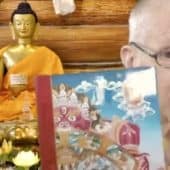Samsara, Nirvana, and Buddha Nature (2021–23)
Teachings on volume three of The Library of Wisdom and Compassion co-authored with His Holiness the Dalai Lama, on our present situation and our highest potential.

Realms of existence
Continuing Chapter 2, describing different realms where beings are reborn, causes for the rebirth and characteristics of the beings in different realms.
View Post
Types of duhkha
Continuing Chapter 2, covering the sections “Three Types of Duhkha”, “Feelings, Afflictions and Duhkha”, and “Six Disadvantages of Cyclic Existence".
View Post
Kinds of duhkha
Continuing the teachings from Chapter 2, explaining eight unsatisfactory conditions and describing characteristics of true duhkha through ten points.
View Post
Our human value
How reflecting on duhkha lessens attachment to worldly pleasures and leads to an aspiration for liberation and awakening.
View Post
The root afflictions: Attachment
How the afflictions cause problems and the importance of combating them. What attachment is and how it differs from aspiration.
View Post
The root afflictions: Anger
Continuing teaching from Chapter 3, explaining four types of clinging, what is anger and how it functions.
View Post
The root afflictions: Arrogance
Teaching from Chapter 3, explaining different types of arrogance.
View Post
The root afflictions: Ignorance
Continuing teaching from Chapter 3, describing different meanings of ignorance and explaining deluded doubt.
View Post
View of a personal identity
Teaching from Chapter 3, describing the view of a personal identity covering the coarse and subtle grasping.
View Post
Afflictive views
Teaching from Chapter 3, describing the last four afflictive views and how the afflictive views impede spiritual practice.
View Post
Other types of afflictions
Continuing teaching from Chapter 3, describing different types of defilements, covering afflictions and underlying tendencies.
View Post
Auxiliary afflictions
Teaching from Chapter 3, explaining the auxiliary afflictions in the Sanskrit tradition, covering the afflictions derived from anger, attachment and ignorance.
View Post